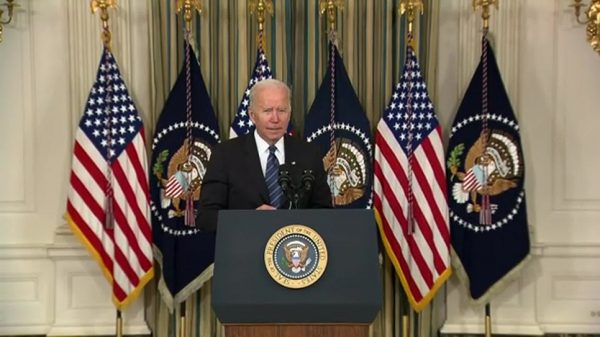US Congress passes $1.2 trillion bipartisan infrastructure bill

Shawdesh Desk:
US Congress has passed a $1.2 trillion bipartisan infrastructure bill, delivering on a major pillar of President Joe Biden’s domestic agenda after months of internal deliberations and painstaking divisions among Democrats.
The final vote was 228-206. Thirteen Republicans voted with the majority of Democrats in support of the bill, though six Democrats voted against it, reports CNN.
The bill now heads to the President’s desk to be signed into law, following hours of delayes and internal debating among Democrats on Friday, including calls from Biden to persuade skeptical progressive members of the Democratic caucus.
The legislation passed the Senate in August, but was stalled in the House as Democrats tried to negotiate a deal on a separate $1.9 trillion economic package, another key component of Biden’s agenda that many Democrats had tied to the fate of the infrastructure bill.
The legislation will deliver $550 billion of new federal investments in America’s infrastructure over five years, including money for roads, bridges, mass transit, rail, airports, ports and waterways. The package includes a $65 billion investment in improving the nation’s broadband infrastructure, and invests tens of billions of dollars in improving the electric grid and water systems. Another $7.5 billion would go to building a nationwide network of plug-in electric vehicle chargers, according to the bill text.
Biden called House Speaker Nancy Pelosi just before midnight to congratulate her on the passage of the infrastructure bill, a source familiar with the call tells CNN. On the call, Pelosi thanked Biden for his help in getting the bill over the finish line as well.
Going into Friday, Pelosi said it was her intention to vote on final passage of the infrastructure bill and the economic package known as the Build Back Better Act. Instead, early Saturday morning, the House passed the rule that will govern debate on the Build Back Better Act on a party-line vote, before adjourning for a week-long committee work period.
But previously expressing confidence that two bills would pass on Friday, Pelosi indicated in the afternoon that they would solely move the infrastructure bill amid push back from moderates that the separate economic agenda bill needs an official cost estimate from the Congressional Budget Office, a process that could take about two weeks.
After hours of negotiating, the House finally moved forward to send the infrastructure bill to Biden’s desk, despite opposition from progressives who had warned that they would sink the infrastructure bill if it moved ahead without the separate economic package.
Throughout Friday, progressives made clear that both bills must move in tandem, and they have pushed that if the $1.9 trillion dollar bill is delayed then the infrastructure bill should be voted on at the same time.
The party had been struggling for months to unite its moderate and progressive wings to enact the President’s agenda, but those efforts had repeatedly stalled out, delivering a series of blows to congressional Democrats and the White House. The party had already had to punt on voting on the infrastructure bill twice in two months due to a separate set of demands from progressives. Biden has gotten personally involved, visiting the Hill twice to rally Democrats, and working the phones with moderates this week. That has still not resolved the impasse.
Ahead of the infrastructure vote, a group of moderates that represented key holdouts on the social spending package issued a statement detailing their commitments to vote for the social spending bill, which was aimed at getting progressives on board to support the infrastructure bill.
Shortly after, Congressional Progressive Caucus Chairwoman Pramila Jayapal released a statement saying that the caucus had reached a deal with fellow Democrats to vote on the infrastructure bill Friday night, abandoning a key tenant of their position, which was to only vote for the infrastructure bill when the social spending bill also would receive a final vote.
Even though Jayapal’s statement brought a significant number of progressives onboard, there were still six progressive holdouts who stuck to their original plan of voting against infrastructure until the social spending plan also received a final vote. The brokered deal between Jayapal and moderates did peel off a significant number of progressives from the vote down infrastructure camp, as that number was as high as 20 at one point during the day on Friday.























Leave a Reply